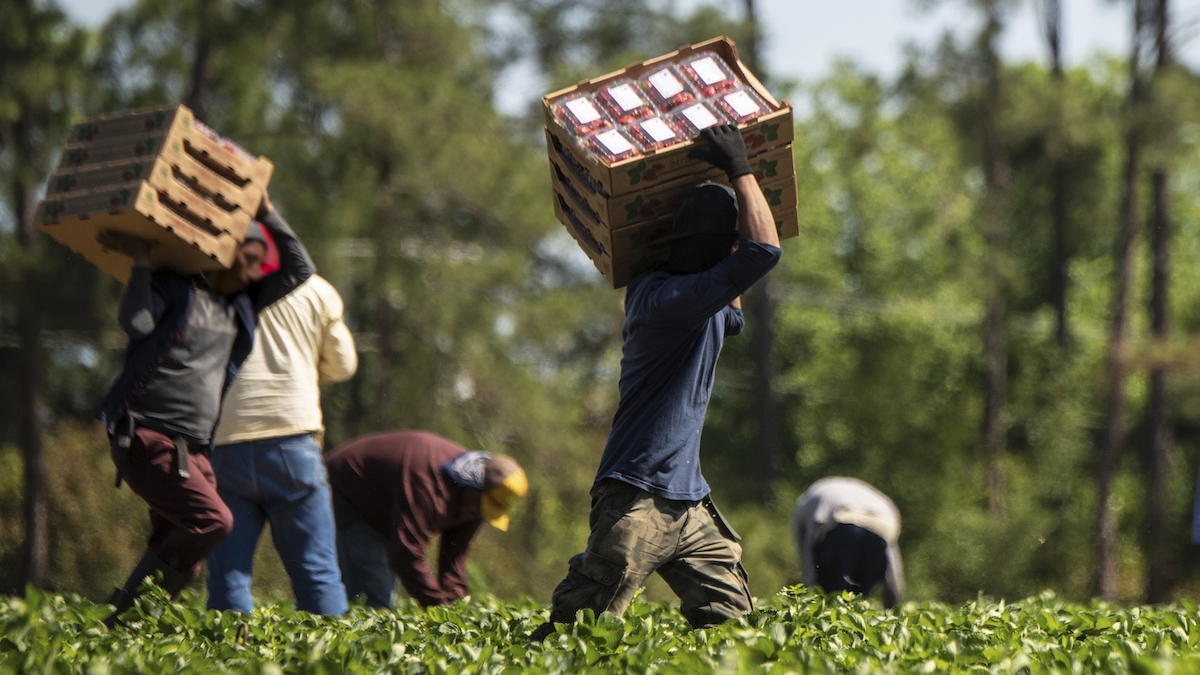SACRAMENTO — California’s farm workers produce one-third of the nation’s food supplies and 75 percent of its fruits and nuts, yet 49 percent of these essential laborers do not have health insurance coverage.
Last year, California unrolled a groundbreaking initiative to provide health care coverage to all, including the more than two million undocumented immigrants who reside in the state. But the plan will bring little relief to the state’s 700,000+ farm workers, many of whom will be ineligible for MediCal because of the very low qualifying income restrictions, explained Joel Diringer, a consultant who worked with UC Merced on its groundbreaking farm worker health study.
An individual seeking to qualify for MediCal must have an income below $18,756 for 2023. At a panel discussion Feb. 7 during the Insure the Uninsured Project’s annual conference in Sacramento, Diringer said about 40 percent of farm workers have incomes above that threshold, and would thus be disqualified. “If you work more than 30 weeks per year, your income is likely to be over MediCal’s limits,” he said.
He proposed raising the income threshold to 250 percent of the federal poverty line, about $34,875 in annual wages. Roughly 80 percent of farm workers would then be covered through MediCal.
Covid’s impact on farmworkers
Those who currently do not qualify for MediCal coverage are being ported to Covered California for low-cost health insurance coverage. But Diringer said most farm workers would still be unable to access care, as co-pays and high deductibles would keep them home.
“Having to meet a $6,000 deductible when your annual income is $20,000: well, you’re just not going to do it,” he said. Covered California does offer plans with little to no monthly premiums, but co-pays and deductibles still remain high, making health care out of reach.
Luz Gallegos, of the TODEC Legal Center in Perris, a border region in Riverside County, said that she and her team have been knocking on doors and going out to the fields to register people for MediCal.
“It is our moral responsibility to let every immigrant in our state know about MediCal expansion. We must push harder for workers who give their lives for our state yet get nothing in return. Farm workers are the biggest asset of our state,” said Gallegos, advocating for unemployment insurance for farm workers.
“A lot of people did not want to stop working. They told me: ‘If I stop working, my family doesn’t eat and I can’t pay rent.’ So many still worked, even though they had Covid,” she said.
Covid-19 hit the agricultural community hard. According to the UC Merced study, using self-reports and a non-fasting blood test, 60 percent were positive for COVID-19. 40 percent of those with COVID-19 reported continuing, long-term health problems, and 31 percent had continued problems with smell. 21 percent reported having continued problems with taste.
More than 81 percent had at least one vaccination.
Fear over public charge rule
Many of the farm workers Gallegos encountered were fearful of triggering the public charge rule and harming their immigration status. On Dec. 23, 2022, the Department of Homeland Security released new public charge rules, which are much broader than the Trump administration’s very narrow definition. Under the new rule, immigrants can avail of Medicaid/MediCal and nutritional assistance without triggering public charge.
The UC Merced farm worker health survey was conducted between July 2021 and April 2022, with the majority of the surveys completed between September and December 2021, when Covid-19 infection rates were still high due to the emergence of the Delta variant.
Some of the key findings of the study,
•Nearly two-thirds (62%) of respondents reported difficulty paying for food or bills since the pandemic.
• 19 percent of respondents reported very low food security, and 23 percent reported low food security. 57 percent reported high or marginal food security.
• 36 percent of the respondents rated their health as only fair or poor.
• 37 percent of men and 47 percent of women reported having at least one chronic condition, diabetes (20%), hypertension (19%) and anxiety (10%) being the most common. Only 43 percent reported having visited a doctor’s clinic.
• Nearly half of farm workers surveyed (43%) reported that their employer “never” provided a heat illness prevention plan as mandated under law.
• Almost one in five (19%) experienced, at one point or another, not being paid wages they earned by an employer.
• More than one-third (36%) of farm workers said they would not be willing to file a report against their employer for workplace non-compliance.
• Of those who would be unwilling to file a report against an employer, about two-thirds (64%) said they would be unwilling to file a report due to fear of retaliation or job loss. • Two-thirds (67%) expressed the highest level of fear of family separation due to deportation on a scale from “never” to “always.”





